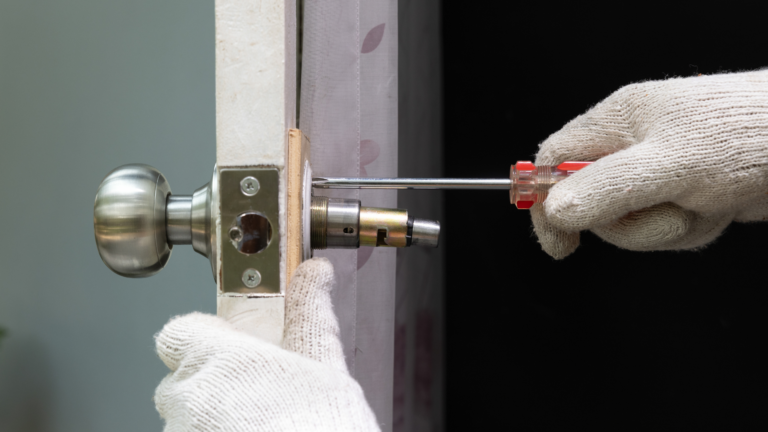Vital to home security, locks can face problems that compromise their effectiveness. It’s essential to address these issues promptly to ensure ongoing safety. Here, we scrutinize common lock problems, providing in-depth insights and extra solutions to ensure your locks are in peak condition.
Locks That Are Tough to Rotate or Sticky
Causes
Rust development, debris buildup, and worn-out internal parts are the main reasons for malfunctioning locks. Over time, dust and grime can collect inside the lock mechanism, affecting its effectiveness. Locks that are frequently exposed to moisture, particularly older ones or those in harsh environments, can develop rust. Continuous use can additionally wear out internal components, leading to more lock issues.
Detailed Solutions
If you are at ease disassembling the lock, clean the internal components thoroughly using a gentle brush and an appropriate cleaner to remove built-up debris and old lubricant. Keep locks functioning well by regularly lubricating them and maintaining a clean surrounding area to stop debris.
Misaligned Door Hardware: Locks and Striker Plates
Causes
Structures that settle structurally over time may experience changes in doors and frames. Also, fluctuations in weather conditions can cause materials to expand and contract, potentially resulting in misaligned doors and frames.
Detailed Solutions
To ensure proper door alignment, start by using a screwdriver to tighten the hinges and adjusting the shims. Remove and reinstall the latch in the proper location if it isn’t aligned with the strike plate; this may need carving out additional space. Moreover, upgrading or replacing weather stripping can improve door alignment and prevent future misalignment problems, ensuring the door operates smoothly and fits securely in its frame.
Keys that Are Broken
Causes
Over time, keys can develop weak points, especially with frequent use or exposure to force, potentially compromising their integrity. Furthermore, metal wear and tear increase with repeated use, raising the likelihood of breakage.
Detailed Solutions
To begin extracting a broken key from a lock, carefully catch and remove the broken piece using a small jigsaw blade or key extractor tool. It is crucial to periodically examine the wear on keys and create copies before they get excessively worn. To avoid breaking keys, do not use excessively worn keys. Should you find it difficult to withdraw the damaged key, you might want to get in touch with a locksmith who can use specialized tools to safely extract it.
Locks with Shake or Wobble
Causes
Locks in high-traffic areas frequently become loose because they are used so often, which wears down their mechanisms. If locks are not installed correctly, they can become loose over time due to insufficient initial fastening.
Detailed Solutions
To keep the lock in good working order, start by removing the cover and tightening all visible screws. Ensure the lock mechanism is securely mounted in the door. In addition, should any worn-out components be noticed, replacing the entire lock mechanism may be essential to maintain its effectiveness.
Need a locksmith? Don't Worry!
Our expert locksmiths are available 24/7. We're here to help with all your emergency lock needs. Don't hesitate, call us now!
Key Won’t Insert Fully
Causes
Foreign items or debris have the potential to block the keyway, causing disruptions in the lock’s smooth operation. Moreover, a bent or damaged key may pose a barrier to full insertion, compromising the lock’s functionality. To maintain smooth key operation and lock security, both issues should be addressed promptly.
Detailed Solutions
Maintain your lock’s functionality by starting with a thin, non-metallic tool to clear any visible debris from the keyway. Then, inspect the key for bends or damage, replacing it with a new one if necessary to avoid complications. Should the problem continue, it may be beneficial to seek assistance from residential locksmiths in West Chester, PA who can thoroughly inspect and clean the lock’s internal components for enhanced performance and security.
Lock is Frozen
Causes
Moisture inside a lock freezing during temperature drops can affect its operation. In severe weather, locks are more likely to freeze without proper weatherproofing, impacting functionality. Adequate protection from the elements is necessary to prevent locks from experiencing moisture buildup and freezing.
Detailed Solutions
Thaw a frozen lock promptly by using a lock de-icer spray with alcohol or similar substances known for melting ice effectively. Applying a lubricant before the cold season helps to repel moisture, and installing a lock cover can protect against harsh weather conditions. Should the lock remain frozen, warm the key carefully with warm water or a lighter before using it to melt the ice inside the lock.
By swiftly resolving common problems and recognizing when to seek professional assistance, homeowners may keep safe and working locks. Regular maintenance, timely upgrades, and proper care play a vital role in maintaining the integrity and reliability of your home’s locking systems.
If you’re experiencing challenges with your home’s locks and are searching for a solution, consider reaching out to residential locksmiths in West Chester, PA. Our proficiency and specialized tools enable us to handle different lock-related issues, enhancing property security and offering reassurance. Call us today without delay!

